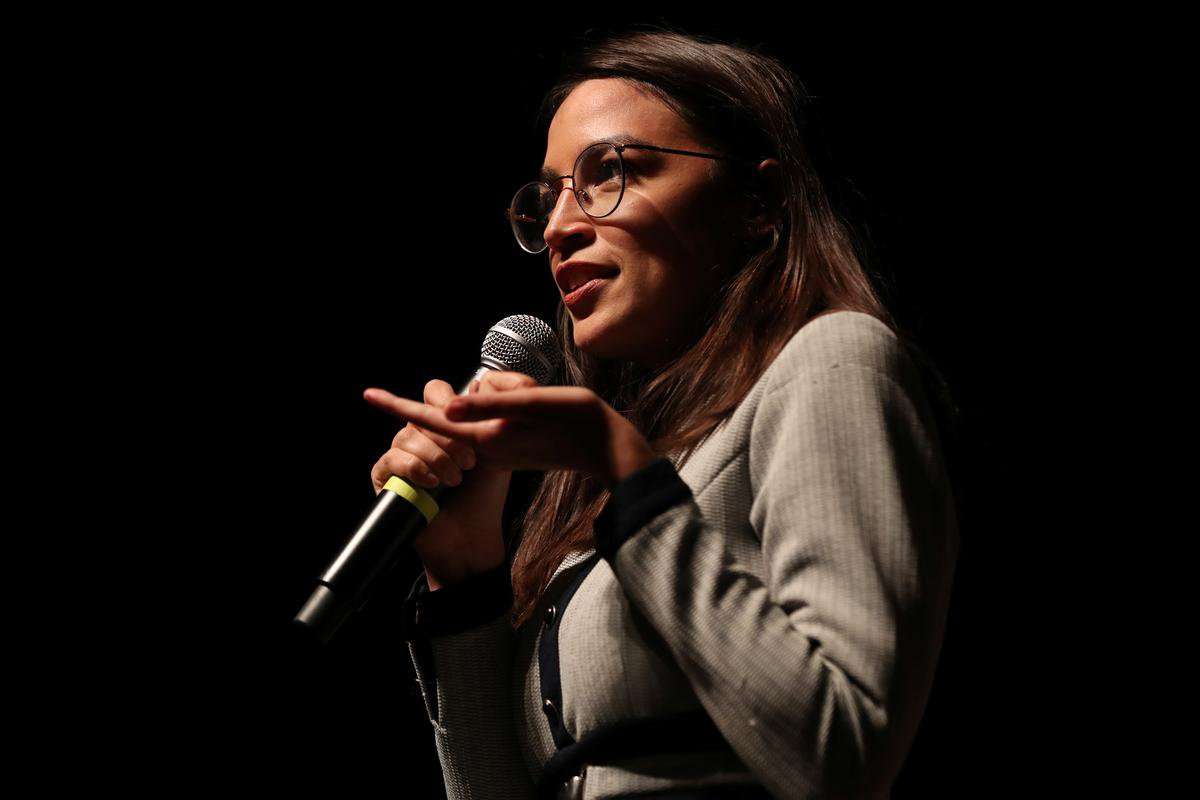WASHINGTON (Reuters) - Two U.S. lawmakers on Thursday unveiled legislation that would create a nationwide electric vehicle (EV) charging network to promote the shift from gasoline-powered vehicles and reduce greenhouse gas emissions.
FILE PHOTO: Rep. Alexandria Ocasio-Cortez speaks at a Democratic 2020 U.S. presidential candidate and U.S. Senator Bernie Sanders (I-VT) campaign rally in Ames, Iowa, U.S., January 25, 2020. REUTERS/Ivan Alvarado
Democratic Representatives Andy Levin and Alexandria Ocasio-Cortez released legislation dubbed the “EV Freedom Act” to create a network of high-speed charging stations within five years along the public roads of the national highway system in the United States at a U.S. Capitol press conference.
“This is the infrastructure bill that we need to be rallying around.” Ocasio-Cortez said. “A lot of naysayers will say, ‘They are trying to get rid of cars.’ Well, we’re not trying to get rid of cars. We’re trying to actually advance and improve our fleets... We have to go electric.”
Levin represents a suburban Detroit district that includes many autoworkers, while Ocasio-Cortez of New York helped unveil the “Green New Deal” earlier this year to transition the U.S. economy away from fossil fuels. The effort is backed by environmental groups and the United Auto Workers union.
U.S. automakers like General Motors Co (GM.N) and Ford Motor Co (F.N) are spending billions of dollars to build new electric vehicles. EV automaker Tesla Inc (TSLA.O) is deploying its own network of fast-charging stations.
The 18-page bill reviewed by Reuters notes a lack of charging stations poses a significant barrier to higher electric vehicle sales.
“There is just no way that we will get to broad scale adoption of electric vehicles until we crush range anxiety and then it will happen precipitously,” Levin told Reuters.
Levin said creating a new fleet of charging stations nationwide will be expensive but will create good paying jobs.
A separate bill introduced this week by Representative Yvette Clark and others would focus on increasing access to EV charging stations in low-income and disadvantaged communities.
Many lawmakers back EVs in part to reduce vehicle emissions to ensure cleaner air especially in urban areas with higher rates of asthma in children.
Democrats running for U.S. president have pledged to spend billions of dollars on new charging stations.
Many Democratic candidates have called for eliminating or largely phasing out gasoline-powered vehicles by 2030 or 2035 and back significant rebates to vehicle owners for scrapping polluting vehicles and shifting to electric vehicles.
Among Democratic presidential contenders, Senator Bernie Sanders wants to spend $85.6 billion building a national EV charging infrastructure network “similar to the gas stations and rest stops we have today.” Former Vice President Joe Biden backs “deployment of more than 500,000 new public charging outlets by 2030.”
Former New York Mayor Mike Bloomberg would require all new cars by 2035 be electric and would build a highway charging network with the goal of a station every 50 miles (80 km).
Republican President Donald Trump opposed efforts in Congress last year to expand a $7,500 tax credit for electric vehicles and has called for eliminating it.

YWAK98alum on February 7th, 2020 at 17:21 UTC »
The real issue with this is that the EV revolution doesn't just change how you put energy into your vehicle, it overwhelmingly changes where you do so.
I've had a Tesla for about 15 months now. I live in the Cleveland area and I've used Superchargers in Erie, Buffalo, Toronto, and in the Columbus area. However, all told, I've used Superchargers on the highway about 10 times. In 2 years. The overwhelming majority of my charging has been at home and at work. After that, the place I charge most often is at my local Whole Foods, which is 5 minutes from my house and free. There's a Destination Charger (faster than a L2 charger, slower than a Supercharger) in a nearby suburb that happens to be right near downtown entertainment.
I don't really think that there's a huge need to shower lavish public funding on highway charging. Maybe exponential growth in the adoption of EVs will change that, but I'm not sure even that would, because people would still do almost all of their charging at home and work.
Now, the Alternative Fuel Infrastructure Tax Credit, which subsidizes installation of EV charging equipment where people actually use it, i.e., homes and office--that's a big deal.
LiquidMotion on February 7th, 2020 at 16:11 UTC »
Hopefully this doesn't go as poorly as paying telecom companies to set up nationwide high speed internet did
Baron164 on February 7th, 2020 at 15:55 UTC »
I'm still surprised that places like Walmart and McDonald's aren't putting in charging stations at all of their locations. Seems like a great way to bring people in and give them something to do while they wait for their vehicles to charge.